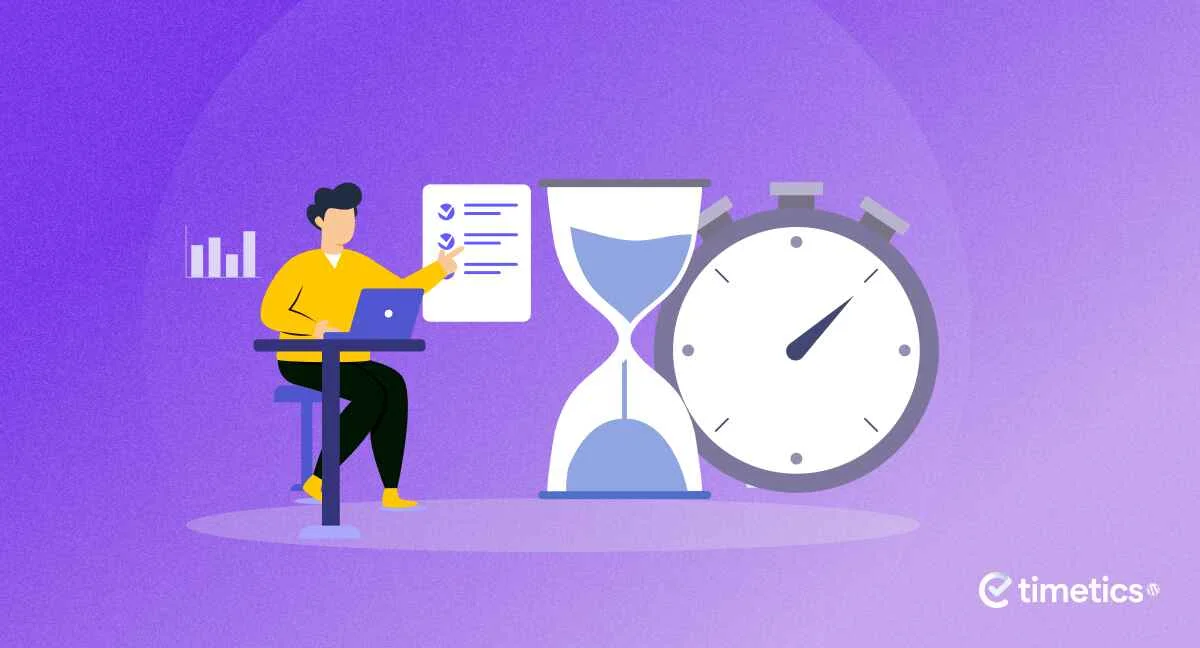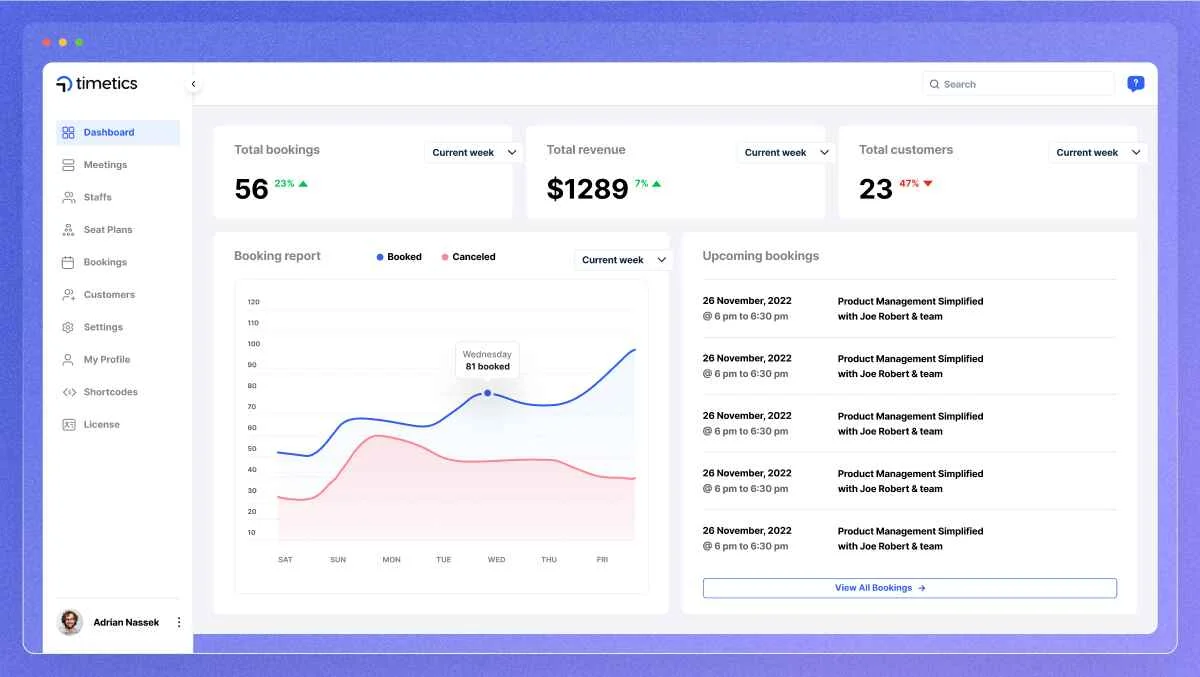Mastering Time Management: Tips & Tricks for Efficient Scheduling

Table of Contents
It’s often said that “time is money!” So the more time you have, the more money you can make! But the total time is fixed at 24 hours maximum. It raises a new question! How some people make more money than others. That’s about time management!
Spending time is not about making money; instead, spending quality time is about bringing in money. So, if you can maximize the quality time, you will have more than the others. At this point, mastering time management comes into play.
“Your greatest asset is your earning ability. Your greatest resource is your time.”
– Brian Tracy
If you plan to increase your quality time, then this blog is for you. We are going to share some exclusive tips and methods that you can follow to master time and schedule management. This is not a generic tips and tricks blog. We have talked with multiple people, studied, researched, and then compiled them in one place for you.
Learn How to make a plan for schedule management.
Our goal is to give you a detailed outline with tips so that you can do quality work in a minimal amount of time. We want you to lead a stress-free, healthy life. We also want you to grow your earnings without pressuring yourself.
Know Your Skills and Boost Your Productivity: Unleash Your Full Potential

Understanding your unique skills and maximizing your productivity are essential ingredients for success in today’s fast-paced world. When you clearly understand your strengths and weaknesses using time management systems, you can harness your skills effectively, leading to increased efficiency, better time management, and ultimately, improved productivity.
Assess Your Skills
To begin, take a step back and assess your skills objectively. Reflect on your experiences, both personal and professional, to identify your areas of expertise and natural talents. Consider the tasks or activities that you excel at or enjoy doing. Look for patterns and recurring themes that highlight your skills and strengths.
Seek Feedback
While self-assessment is valuable, seeking feedback from others can provide additional insights. Reach out to trusted colleagues, mentors, or friends who can provide an outside perspective on your skills and productivity. Their observations and feedback can offer valuable perspectives and help you gain a well-rounded understanding of your strengths.
Embrace a Strengths-Based Approach
Once you have identified your skills, embrace a strengths-based approach. Focus on leveraging your strengths rather than dwelling on your weaknesses. By directing your energy toward activities that align with your natural talents, you can enhance your performance, increase your confidence, and achieve better results.
Develop New Skills
While understanding your existing skills is crucial, don’t limit yourself to what you already possess. Take proactive steps to develop new skills that align with your goals and areas of interest. Continuous learning and personal development expand your skill set, broaden your horizons, and open new opportunities for growth and productivity.
Delegate or Outsource
Recognize that you don’t have to excel at everything. Identify tasks or responsibilities that fall outside your skill set or areas of expertise. Delegate or outsource those tasks to individuals who possess the necessary skills, freeing up your time to focus on activities where you can add the most value.
Set Smart Goals
Setting specific, measurable, attainable, relevant, and time-bound (SMART) goals is instrumental in optimizing your productivity. Define clear objectives that align with your skills and desired outcomes. Break them down into actionable steps, and track your progress along the way. SMART goals provide focus, direction, and motivation to help you make the most of your skills.
Knowing your skills is the first step toward unlocking your full potential and maximizing productivity. By understanding your unique strengths, seeking feedback, and adopting a growth mindset, you can optimize your time and energy. Remember, productivity is not about doing everything; it’s about doing the right things that align with your skills and goals.
Prioritize Your Work for Enhanced Productivity: The Art of Effective Decision-Making

In today’s fast-paced world, it’s easy to get overwhelmed by a seemingly never-ending to-do list. However, by mastering the art of prioritization, you can regain control of your workload, increase your productivity, and achieve better outcomes. Prioritizing your work allows you to focus your time and energy on tasks that truly matter and align with your goals.
Define Your Priorities
Begin by gaining clarity on your overall goals and objectives. Understand what matters most to you personally and professionally. This awareness will guide your decision-making process when it comes to prioritizing tasks. Aligning your work with your priorities ensures that you are investing your time and energy in activities that bring the most significant value.
Determine Urgency and Importance
When faced with multiple tasks, assess their urgency and importance. Urgent tasks require immediate attention, while important tasks contribute significantly to your long-term goals. Use techniques like the Eisenhower Matrix to categorize tasks into four quadrants: urgent and important, important but not urgent, urgent but not important, and neither urgent nor important. This framework helps you prioritize effectively by focusing on the tasks that fall in the urgent and important quadrant.
Consider Impact and Consequences
When prioritizing, evaluate the potential impact and consequences of each task. Ask yourself: What will happen if I don’t complete this task? Will it affect other projects or stakeholders? Understanding the potential ramifications of your choices will help you prioritize tasks that have the most significant impact on your goals and overall productivity.
Assess the Time and Effort Required
Consider the time and effort required for each task. Identify tasks that are quick wins and can be completed efficiently. Prioritize tasks that may be time-consuming or require substantial effort, ensuring you allocate sufficient time and resources for them. Strive for a balance between tasks that can be accomplished quickly and those that require more time and effort.
Focus on High-Value Activities
When prioritizing, prioritize activities that generate the highest value or have the most significant impact on your goals. These activities contribute directly to your desired outcomes and move you closer to your objectives. By concentrating on high-value tasks, you can maximize your productivity and make efficient use of your time.
Learn to Delegate or Decline
Recognize that you cannot do everything yourself. Assess your workload and identify tasks that can be outsourced or entrusted to capable individuals. Delegating frees up your time to focus on tasks that require your specific expertise and attention. Similarly, learn to decline requests that do not align with your priorities or are beyond your capacity.
Regularly Review and Adjust
Prioritization is not a one-time activity. It requires regular review and adjustment. Take time to reassess your priorities periodically. As circumstances change and new tasks emerge, evaluate their importance and make necessary adjustments to ensure your priorities remain aligned with your goals.
Effective prioritization is a cornerstone of productivity and success. By defining your priorities, considering urgency and importance, assessing impact and effort, and focusing on high-value activities, you can make informed decisions and optimize your work. Embrace the art of prioritization and watch as your productivity increases.
Follow the “Difficult First” Rule: Conquer Challenges and Boost Productivity

Procrastination often creeps in when faced with daunting or challenging tasks, leading to decreased productivity and unnecessary stress. However, implementing the “Difficult First” rule can overcome this tendency and unlock your full productivity potential.
Harness Your Peak Energy and Focus
Our energy and focus levels tend to be highest in the morning after a good night’s sleep. By starting your day with the most challenging tasks, you can capitalize on this peak energy and focus. Reserve this time for critical tasks that require deep thinking, problem-solving, or creativity. By tackling these demanding tasks early, you set a positive tone for the rest of the day.
Overcome Procrastination
Procrastination often arises from the fear of failure or the perceived difficulty of a task. By following the “Difficult First” rule, you confront these challenges head-on. Taking immediate action helps break the cycle of procrastination and builds momentum for the rest of your day. Once you conquer the most challenging task, you’ll feel a sense of accomplishment that propels you forward.
Boost Motivation and Productivity
Accomplishing a difficult task early in the day provides a significant motivational boost. You’ll experience a surge of confidence and a sense of progress, which fuels your productivity for the remainder of your tasks. As the day progresses, the importance of relief from completing the challenging task reinforces your ability to handle any obstacles that come your way.
Following the “Difficult First” rule empowers you to confront challenges head-on, build momentum, and increase your productivity. By harnessing your peak energy and focus, overcoming procrastination, and celebrating achievements, you can create a positive cycle of accomplishment and efficiency
Learn to Say No: Empowering Yourself through Selective Commitments

In our fast-paced lives, learning to say no is a vital skill that allows us to set boundaries, prioritize our time effectively, and maintain a healthy work-life balance. By recognizing our limitations and being selective in our commitments, we can optimize our productivity and focus on what truly matters.
Setting Boundaries
Saying no enables us to establish boundaries and protect our time and energy. It is a declaration of self-care and respect for our own needs. By setting clear boundaries, we create a healthy balance between work, personal life, and other commitments.
Recognizing Your Capacity
Learning to say no means being realistic about what we can reasonably handle. By understanding our limitations, we can avoid overcommitment and burnout. Saying no to non-essential tasks allows us to focus on what truly aligns with our goals and priorities.
Respecting Your Time and Others
Saying no is not only about self-preservation but also about respecting our time and the time of others. By declining requests or projects that do not align with our goals or priorities, we allow ourselves and others to focus on more meaningful and impactful endeavors. This practice fosters a culture of efficiency and effectiveness.
Learning to say no is a transformative practice that empowers us to prioritize, set boundaries, and optimize our productivity. By recognizing our capacity, being selective in our commitments, and communicating effectively, we can achieve a healthier work-life balance, maintain focus, and excel in areas that truly matter to us. Embrace the power of saying no, and experience the positive impact it has on your overall productivity and fulfillment.
Maintain Deadline: Cultivating Time Discipline for Enhanced Productivity

Meeting deadlines is a critical aspect of effective time management and productivity. It demonstrates professionalism, reliability, and a commitment to delivering results.
Understanding the Importance of Deadlines
Deadlines provide structure and accountability to our work. They help us prioritize tasks, allocate resources efficiently, and stay focused on achieving desired outcomes. Meeting deadlines instils trust and credibility, both in personal and professional settings.
Break Tasks into Smaller Milestones
To maintain deadlines effectively, break down larger tasks or projects into smaller, manageable milestones. This approach allows for better planning, tracking progress, and timely completion of each milestone. By focusing on smaller achievable goals, you maintain momentum and minimize the risk of missing overall project deadlines.
Set Realistic and Specific Deadlines
When setting deadlines, ensure they are realistic and attainable. Consider the complexity and scope of the task, available resources, and any potential dependencies. Setting specific deadlines helps create a sense of urgency and clarity, enabling you to allocate time and resources more effectively.
Utilize Time Management Tools and Techniques
Various tools and techniques can aid in maintaining deadlines. Utilize digital calendars, task management apps, or project management software to schedule and track your tasks. Set reminders and establish alerts to stay on track and complete tasks within the designated timeframes.
Harness the Power of Time Management Tools for Optimal Productivity

In today’s fast-paced world, time management is essential for maximizing productivity and achieving our goals. Fortunately, we have access to a wide array of time management tools that can help us effectively plan, organize, and track our tasks.
Streamline Task Organization
Time management tools offer features to organize your tasks and responsibilities efficiently. Utilize task management apps or project management platforms to create to-do lists, categorize tasks, assign priorities, and set deadlines. By centralizing your tasks in one place, you can easily access and manage them, reducing the risk of overlooking important assignments.
Enhance Time Tracking and Productivity Monitoring
Many time management tools include built-in timers or time-tracking functionalities. Use these features to monitor the time spent on specific tasks or projects. Tracking your time helps you identify areas of improvement, understand your productivity patterns, and make informed adjustments to optimize your workflow.
Schedule and Allocate Time Effectively
Time management tools provide calendar functionalities that allow you to schedule your tasks and allocate time blocks for different activities. Take advantage of these features to create a structured daily, weekly, or monthly schedule. By assigning dedicated time slots for specific tasks, you can prioritize effectively and ensure that essential activities receive the attention they deserve.
Popular Time Management Tools

- Timetics AI: “Timetics” is the best WordPress calendar plugin designed to revolutionize time tracking and management. With its intuitive interface and extensive features, Timetics streamlines the process of monitoring and analyzing time usage, arranging virtual meetings, enhancing productivity and efficiency.
- Todoist: A versatile task management app with features like reminders, project organization, and collaboration functionalities.
- Trello: A visual project management tool that uses boards, lists, and cards to help you organize and track tasks.
- Google Calendar: A widely used calendar application that allows you to schedule events, set reminders, and share calendars with others.
- Asana: A comprehensive project management platform that enables task management, team collaboration, and progress tracking.
- RescueTime: A time-tracking tool that monitors your computer and app usage, providing insights into your productivity habits.
Set Goal and Target
Setting goals and targets is a crucial aspect of effective time management. By clearly defining what you want to achieve and establishing specific targets, you provide yourself with direction and purpose. Goals serve as a roadmap, guiding your actions and helping you prioritize tasks that align with your objectives. They provide motivation, focus, and a sense of accomplishment when achieved. Whether it’s short-term goals or long-term aspirations, setting clear targets enables you to make better decisions, allocate time and resources efficiently, and stay on track toward success.
Give Prize to Yourself
Rewarding yourself is an essential component of effective time management and personal motivation. Acknowledging your achievements and milestones with meaningful rewards reinforces positive behavior and boosts your morale. By setting milestones or targets along your journey and planning rewards for reaching them, you create a sense of anticipation and excitement. These rewards can be anything that brings you joy, such as indulging in a favorite activity, treating yourself to a small gift, or taking a well-deserved break. By celebrating your accomplishments, you create a positive cycle of motivation, productivity, and self-appreciation that fuels your progress and encourages continued success. So, remember to pause, celebrate your victories, and give yourself the rewards you deserve.
Consider Balancing
Finding balance in life is crucial for overall well-being and effective time management. It involves prioritizing and allocating time to different areas of your life, such as work, relationships, self-care, and leisure activities. Striving for balance allows you to prevent burnout, maintain good mental and physical health, and nurture important aspects of your life. By considering balance, you ensure that no single area dominates your time and energy, fostering harmony and satisfaction. It may involve setting boundaries, learning to say no, and practicing self-care. Embracing a balanced approach empowers you to lead a fulfilling and purposeful life, where you can excel in multiple areas while maintaining a healthy work-life integration.
Avoid Burnout
Avoiding burnout is essential for maintaining well-being and productivity. To prevent burnout, recognize the signs, such as fatigue and decreased motivation, and prioritize self-care activities like exercise and relaxation. Set boundaries between work and personal life, delegate tasks, and learn to say no when necessary. Take regular breaks to recharge and foster a supportive work environment. Monitor and manage stress levels through coping mechanisms such as deep breathing and seeking support. By implementing these strategies, you can protect your physical and mental health, maintain a healthy work-life balance, and avoid the detrimental effects of burnout.
Mornings for Important Tasks
Maximizing productivity by tackling important tasks in the morning is a proven strategy for effective time management. Mornings offer a fresh start, a clear mind, and fewer distractions, making it an optimal time to focus on critical and challenging work. By prioritizing important tasks early in the day, you capitalize on your peak energy and concentration levels. This approach sets a positive tone for the rest of the day and creates momentum for accomplishing other tasks. Whether it’s creative work, strategic planning, or complex problem-solving, dedicating your mornings to important tasks allows you to make significant progress and feel a sense of achievement. By harnessing the power of mornings, you can optimize your productivity, increase efficiency, and set the stage for a successful day.
Quality Over Quantity
In the realm of time management, prioritizing quality over quantity is a key principle for maximizing productivity and achieving meaningful outcomes. Instead of focusing solely on completing a high volume of tasks, emphasis is placed on delivering work of the highest caliber. By adopting a quality-centric approach, you ensure that your efforts are directed toward tasks that truly matter and contribute to your goals. This involves investing sufficient time and attention to detail, honing your skills, and producing work that reflects excellence. Prioritizing quality over quantity not only enhances the value of your output but also saves time in the long run by minimizing errors, revisions, and rework. By striving for excellence, you elevate your work, build a reputation for delivering superior results, and make a more significant impact in your endeavors.
Sleep at least 7–8 hours.
Getting an adequate amount of sleep, ideally between 7 and 8 hours per night, is a crucial aspect of effective time management and overall well-being. While it may seem counterintuitive, prioritizing sleep actually enhances productivity and cognitive function. Sufficient sleep provides numerous benefits, including improved concentration, memory retention, creativity, and problem-solving abilities. It also helps regulate mood, reduce stress, and boost immune function.
By ensuring you get enough sleep, you set the foundation for a productive and energized day ahead. It’s important to prioritize sleep as part of your time management strategy, as it enhances your overall performance, decision-making skills, and overall quality of life. So, make it a habit to prioritize and protect your sleep, and reap the rewards of a well-rested mind and body.
Unlocking Productivity and Success
Mastering time management is essential for maximizing productivity and achieving success in today’s fast-paced world. It requires understanding our strengths, prioritizing tasks effectively, and conquering challenges head-on. By adopting a strengths-based approach, we can leverage our unique skills and talents to excel in our endeavors. This involves identifying our strengths and focusing on tasks that align with our goals and bring the most significant value. Additionally, developing new skills and abilities expands our capabilities and increases our efficiency.
Effective time management also involves setting priorities based on importance, urgency, impact, and effort. By following the “Difficult First” rule, we overcome procrastination, boost motivation, and increase productivity. Learning to say no allows us to set boundaries, respect our time and others, and maintain a healthy work-life balance. Meeting deadlines showcases professionalism and reliability while utilizing time management tools enhances organization and productivity.

